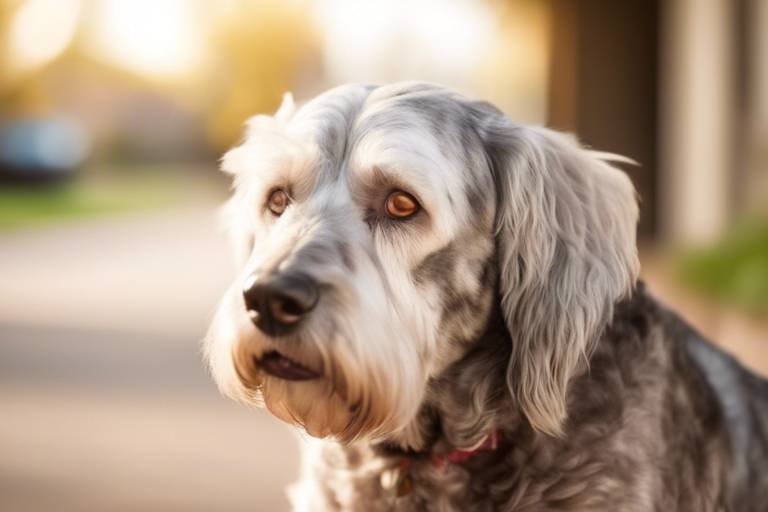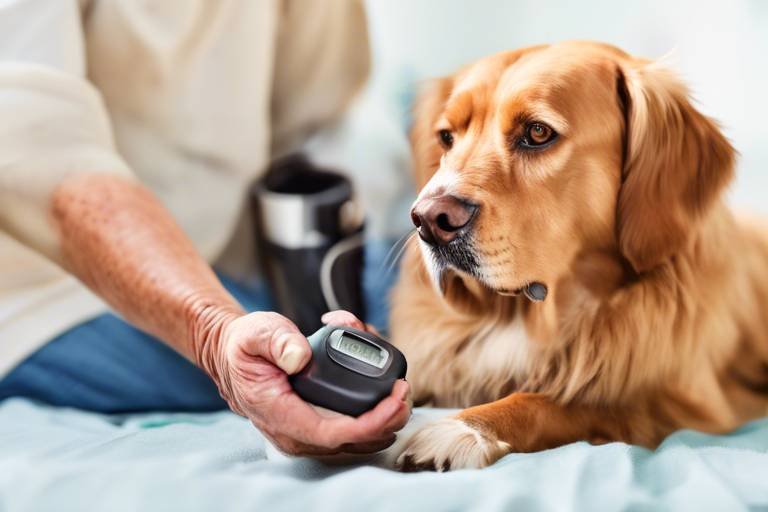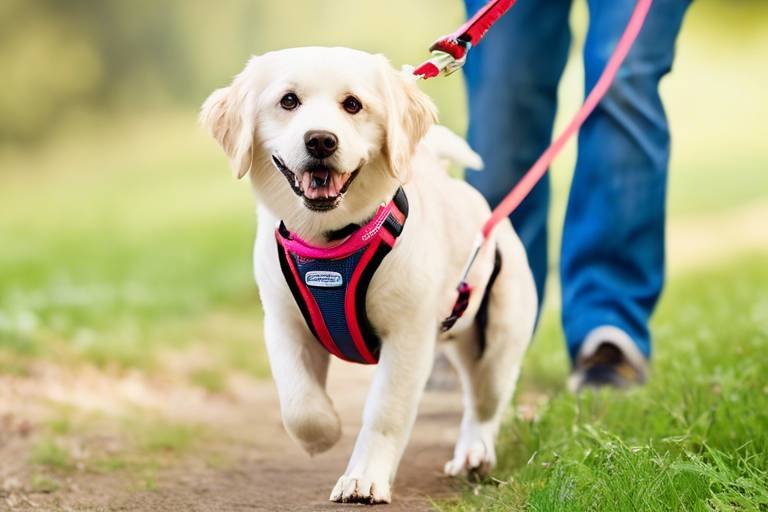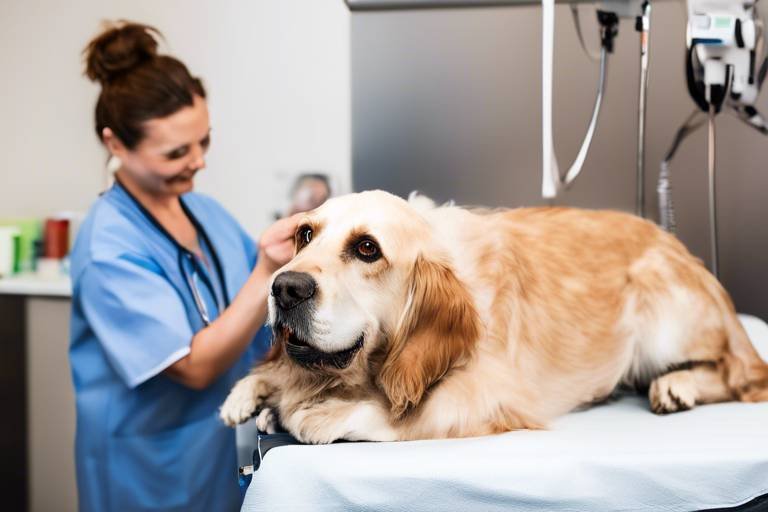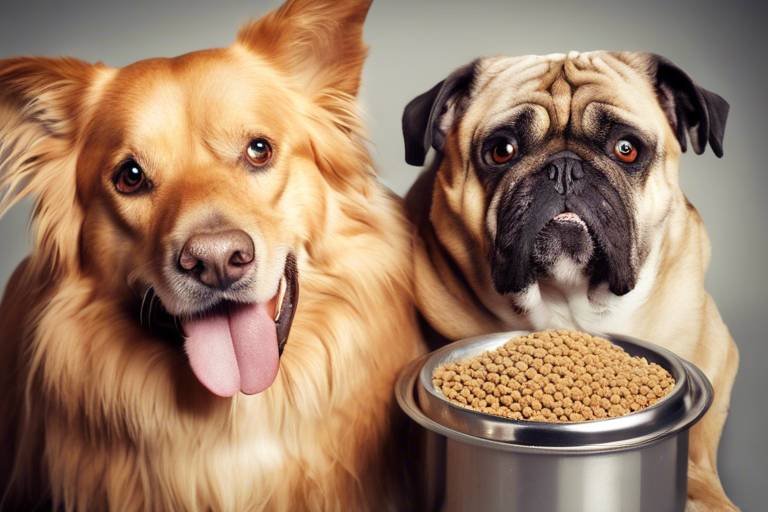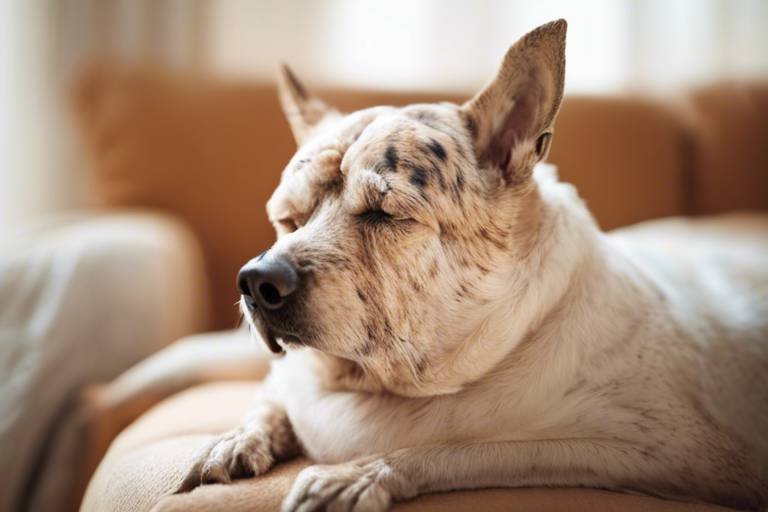How to Handle Senior Pets with Digestive Issues
As our furry friends age, they often face a myriad of health challenges, and one of the most common issues is digestive problems. Just like us, senior pets can experience a variety of digestive distress symptoms that can affect their overall quality of life. It’s not just about keeping them comfortable; it’s about ensuring they maintain a healthy lifestyle as they grow older. Imagine trying to enjoy your favorite meal while feeling bloated or nauseous; that’s what our pets may go through, and it’s up to us to help them navigate these challenges.
In this article, we’ll dive deep into the world of senior pet digestive health. We’ll explore the various types of digestive issues, how to recognize the signs of distress, and effective strategies for managing these conditions. Whether you have a wise old cat or a seasoned dog, understanding their needs is crucial. So, let’s embark on this journey together, ensuring our beloved companions can enjoy their golden years without the discomfort of digestive woes.
Digestive problems are not just a minor inconvenience; they are a significant concern for senior pets. As pets age, their digestive systems can become less efficient, leading to various issues such as constipation, diarrhea, and even food sensitivities. The aging process can affect the stomach’s ability to produce acids and enzymes, which are essential for breaking down food. Additionally, conditions like arthritis can make it painful for pets to adopt the proper eating posture, further complicating their digestive health.
There are several types of digestive issues that senior pets may face, including:
- Gastrointestinal upset: This can manifest as vomiting or diarrhea, often triggered by dietary changes or stress.
- Food intolerances: Older pets may develop sensitivities to certain ingredients that never bothered them before.
- Constipation: A common issue due to reduced physical activity and changes in diet.
Understanding these issues is the first step in managing your pet’s health effectively. By being aware of the signs and symptoms, you can take proactive measures to ensure your pet remains comfortable and healthy.
Recognizing the signs of digestive distress in senior pets is crucial for timely intervention. Ignoring these symptoms could lead to more severe health problems down the line. Here are some common indicators that your pet may be experiencing digestive issues:
Vomiting and diarrhea are frequent indicators of digestive issues. If your senior pet is experiencing these symptoms, it’s essential to pay attention to their frequency and severity. Occasional vomiting might be nothing to worry about, but if it becomes persistent, it could signal a more serious condition. Diarrhea can lead to dehydration, which is particularly dangerous for older pets. Always consult your veterinarian if these symptoms last more than 24 hours.
Understanding what triggers vomiting and diarrhea can help manage your pet's condition. Common dietary factors include sudden changes in food, spoiled food, or even certain treats. Environmental factors like stress from moving or new pets in the household can also contribute. Keeping a close eye on your pet's habits can help you identify these triggers and avoid them in the future.
Knowing when to consult a veterinarian is vital. If your pet shows any of the following signs, it’s time to make that call:
- Persistent vomiting or diarrhea lasting more than 24 hours
- Blood in vomit or stool
- Severe lethargy or weakness
- Loss of appetite for more than a day
It’s always better to be safe than sorry when it comes to your pet’s health.
Changes in appetite and weight can indicate underlying digestive problems. If your senior pet is suddenly eating less, it could be a sign that they are experiencing discomfort. Conversely, if they are eating more but losing weight, this could indicate a more serious issue. Monitoring your pet's eating habits is essential. Regular weigh-ins can help you catch any concerning trends early on.
Making appropriate dietary changes can significantly improve your senior pet's digestive health. A well-balanced diet tailored to their needs can alleviate many digestive issues. Look for high-quality, easily digestible foods that are specifically designed for senior pets. These foods often have lower fat content and added fiber to aid digestion.
Selecting the right food is essential for managing digestive problems. Look for options that are rich in fiber, as this can help regulate digestion. Additionally, consider foods that contain probiotics, which can promote a healthy gut flora. Always consult your veterinarian for recommendations tailored to your pet's specific needs.
Establishing a consistent feeding schedule and appropriate portion sizes can enhance digestion. Feeding smaller, more frequent meals can help reduce the burden on your pet's digestive system. Here are some tips for effective feeding routines:
- Divide daily food intake into smaller meals.
- Maintain a regular feeding schedule.
- Avoid sudden changes in food to prevent gastrointestinal upset.
Natural remedies and supplements can offer relief for digestive issues. Incorporating certain supplements into your pet's diet can support their digestive health and overall well-being. Always consult your veterinarian before introducing any new supplements.
Probiotics and digestive enzymes can support gut health. Probiotics help maintain a healthy balance of gut bacteria, while digestive enzymes aid in breaking down food. Look for high-quality supplements that are specifically formulated for pets.
Proper hydration is vital for digestive health. Ensure your senior pet always has access to fresh water. Dehydration can exacerbate digestive issues, so encourage your pet to drink by providing water bowls in multiple locations and considering wet food options to increase their fluid intake.
Ongoing monitoring and follow-up care are crucial for managing digestive issues. Keeping track of your pet's health can help you catch any changes early. Regular veterinary visits are essential for senior pets, as they can help detect potential problems before they escalate.
Maintaining a health journal can help track your pet's symptoms and dietary changes. Documenting what your pet eats, their weight, and any digestive issues can provide valuable information for your veterinarian. This proactive approach can lead to more effective treatment plans.
Regular check-ups are essential for early detection of potential issues. Schedule routine visits with your veterinarian to ensure your senior pet remains in good health. These visits can help identify any digestive problems before they become serious.
Q: What are the common digestive issues in senior pets?
A: Common issues include vomiting, diarrhea, constipation, and food intolerances.
Q: How can I tell if my pet is experiencing digestive distress?
A: Look for signs such as vomiting, diarrhea, changes in appetite, or weight loss.
Q: What dietary changes should I consider for my senior pet?
A: Opt for high-quality, easily digestible foods and consider adding probiotics and fiber.
Q: When should I seek veterinary help?
A: If symptoms persist for more than 24 hours or if you notice blood in vomit or stool, consult your vet immediately.

Understanding Digestive Issues in Senior Pets
This article explores effective strategies for managing digestive problems in senior pets, helping owners ensure their furry companions maintain a comfortable and healthy lifestyle as they age.
As our beloved pets age, their bodies undergo numerous changes, and digestive issues often become a common concern. Just like humans, senior pets experience a decline in their digestive efficiency, making them more susceptible to various gastrointestinal problems. These issues can stem from a multitude of factors, including a decrease in physical activity, changes in metabolism, and even alterations in their gut microbiome. It's essential for pet owners to understand these changes and recognize the signs of digestive distress early on.
Some of the most prevalent digestive issues in senior pets include:
- Constipation: This can occur due to decreased activity levels or inadequate hydration.
- Vomiting: Often a sign of dietary indiscretion or underlying health problems.
- Diarrhea: This can be triggered by sudden changes in diet or infections.
- Loss of Appetite: This may indicate dental issues or more serious health concerns.
Understanding why senior pets are more prone to these digestive issues can help owners take proactive steps. Aging pets often have a slower digestive tract, which can lead to impaired nutrient absorption. Furthermore, their teeth may not be as strong, making it difficult to chew harder foods, which can exacerbate digestive problems. Additionally, medications that older pets may take for other health issues can also affect their gastrointestinal health.
To effectively manage these issues, pet owners should be vigilant about their pet's diet and habits. Regular monitoring and adjustments can make a significant difference in their overall well-being. A well-balanced diet, rich in fiber and easily digestible ingredients, can help alleviate some of these concerns. It's also crucial to provide senior pets with plenty of fresh water and encourage them to stay active, as physical activity plays a vital role in maintaining a healthy digestive system.
In summary, recognizing and understanding the unique digestive challenges faced by senior pets is the first step towards ensuring they live a happy and healthy life. By being proactive and attentive, pet owners can help their furry friends navigate the aging process with greater ease.
Recognizing the signs of digestive distress is crucial for timely intervention. Here, we outline typical symptoms that pet owners should watch for in their aging companions.
Vomiting and diarrhea are frequent indicators of digestive issues. This subsection elaborates on their causes and when they signify a need for veterinary attention.
Understanding what triggers vomiting and diarrhea can help manage your pet's condition. This section highlights common dietary and environmental factors that may contribute.
Knowing when to consult a veterinarian is vital. Here, we provide guidelines for determining if your pet's symptoms require professional evaluation.
Changes in appetite and weight can indicate underlying digestive problems. This section discusses how to monitor your pet's eating habits and the importance of maintaining a healthy weight.
Making appropriate dietary changes can significantly improve your senior pet's digestive health. We explore the types of diets that can alleviate digestive issues.
Selecting the right food is essential for managing digestive problems. This subsection reviews different food options tailored for senior pets with sensitive stomachs.
Establishing a consistent feeding schedule and appropriate portion sizes can enhance digestion. Here, we provide tips on how to implement effective feeding routines for your pet.
Natural remedies and supplements can offer relief for digestive issues. This section discusses various options that may help improve your senior pet's digestive health.
Probiotics and digestive enzymes can support gut health. This subsection explains their benefits and how to incorporate them into your pet's diet.
Proper hydration is vital for digestive health. Here, we emphasize the importance of ensuring your senior pet drinks enough water and tips for encouraging hydration.
Ongoing monitoring and follow-up care are crucial for managing digestive issues. This section provides guidance on how to keep track of your pet's health and when to revisit the vet.
Maintaining a health journal can help track your pet's symptoms and dietary changes. This subsection discusses how to effectively document your pet's health journey.
Regular check-ups are essential for early detection of potential issues. This section highlights the importance of routine veterinary visits for senior pets with digestive concerns.
Here are some common questions pet owners have about managing digestive issues in senior pets:
- What are the signs my senior pet has a digestive issue? Look for symptoms like vomiting, diarrhea, changes in appetite, and weight loss.
- How can I improve my senior pet's diet? Consult your vet for recommendations tailored to your pet's specific needs, focusing on high-quality, easily digestible foods.
- When should I take my pet to the vet? If you notice persistent symptoms or significant changes in behavior, it's best to seek professional advice.
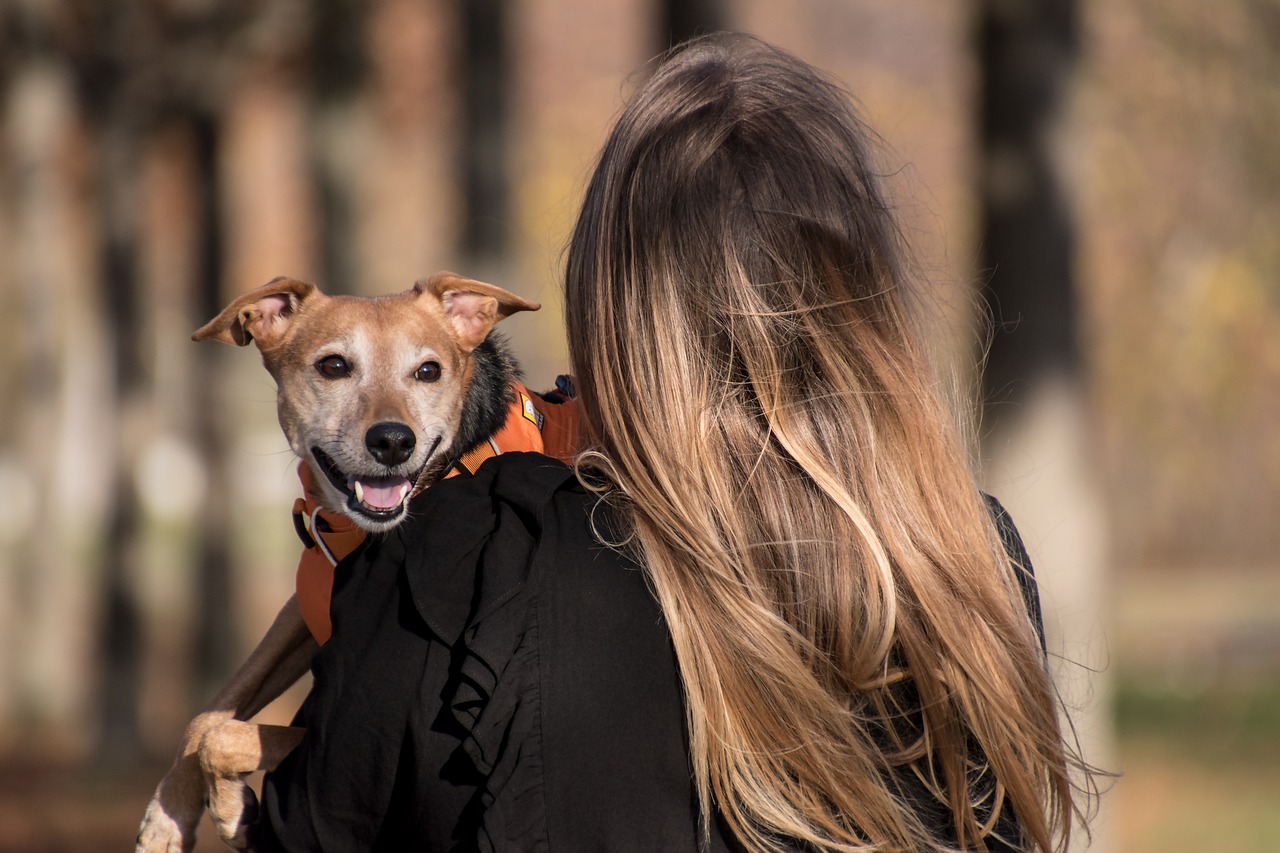
Common Symptoms of Digestive Distress
Digestive distress in our beloved senior pets can manifest in various ways, and recognizing these symptoms early is crucial for their well-being. As pets age, their digestive systems become more sensitive, making them prone to a range of issues. It's essential for pet owners to be vigilant and attentive to any changes in their furry companions. Some common signs of digestive distress include:
- Vomiting: This can range from occasional to frequent episodes. If your pet is vomiting more than once or twice, it’s time to take notice.
- Diarrhea: Loose stools can lead to dehydration and should not be ignored, especially if they persist for more than a day.
- Changes in Appetite: A sudden increase or decrease in your pet's eating habits can indicate underlying issues.
- Weight Loss: Unexplained weight loss can be a red flag that something is wrong in your pet’s digestive system.
- Abdominal Pain: If your pet seems uncomfortable or is reluctant to be touched around their belly, they may be experiencing pain.
Understanding these symptoms is like having a roadmap to your pet's health. For instance, if your pet is experiencing vomiting and diarrhea simultaneously, it could indicate a more serious condition, such as an infection or dietary indiscretion. On the other hand, if they’re just a bit off their food, it might be nothing more than a temporary upset. However, the key is to pay attention to the frequency and duration of these symptoms.
Moreover, keep in mind that some symptoms may not always be apparent. For example, pets can sometimes hide their discomfort or pain, making it challenging for owners to notice anything amiss. Regularly observing your pet's behavior can help you catch subtle changes. If you notice your pet being less active or more withdrawn than usual, this could be a sign that they are experiencing digestive distress. Think of it as your pet’s way of telling you that something isn’t right—just like when we feel under the weather and prefer to curl up on the couch.
So, what should you do if you notice these symptoms? The first step is to keep a close eye on your pet and document any changes. This information can be extremely helpful when discussing your pet's health with your veterinarian. Remember, your pet relies on you to be their advocate, so staying informed and proactive can make all the difference in ensuring they lead a healthy and happy life.
Q: How can I tell if my pet's digestive issues are serious?
A: If your pet exhibits symptoms like persistent vomiting, diarrhea, or significant changes in appetite and behavior, it’s important to consult your veterinarian as soon as possible.
Q: Are there specific diets that can help with digestive issues in senior pets?
A: Yes, diets that are easily digestible and formulated for senior pets can help manage digestive problems. Look for high-quality, low-fat options and consider incorporating probiotics.
Q: How often should I take my senior pet to the vet for check-ups?
A: Regular veterinary visits are crucial for senior pets. Aim for at least twice a year, or more frequently if your pet is experiencing digestive issues or other health concerns.
Vomiting and Diarrhea
Vomiting and diarrhea are two of the most common signs that your senior pet may be experiencing digestive issues. These symptoms can be alarming, not just for your furry friend but for you as a pet owner as well. Imagine your beloved companion, who once enjoyed their meals with gusto, now struggling with an upset stomach. It's essential to understand that while occasional vomiting or diarrhea can occur, frequent episodes warrant your attention. In many cases, these symptoms can indicate underlying health problems that could be more serious, especially in older pets.
When your pet vomits, it can be due to various reasons, including dietary indiscretion, infections, or even more severe conditions like pancreatitis or kidney disease. Similarly, diarrhea can stem from a change in diet, parasites, or food intolerances. The key is to observe the frequency and severity of these symptoms. If your pet is vomiting multiple times a day or experiencing persistent diarrhea, it’s time to take action.
To help you identify the potential causes of vomiting and diarrhea in your senior pet, consider the following common triggers:
- Dietary Changes: A sudden switch in food can upset your pet's stomach.
- Food Intolerances: Some pets develop sensitivities to ingredients they previously tolerated.
- Infections: Bacterial or viral infections can lead to gastrointestinal distress.
- Parasites: Worms and other parasites can cause severe digestive issues.
- Stress: Changes in the environment or routine can trigger digestive upset.
As a pet owner, it’s crucial to monitor your pet’s health closely. If you notice that your senior pet is not only vomiting or having diarrhea but also showing signs of lethargy, dehydration, or blood in their stool, do not hesitate to contact your veterinarian. These could be signs of a more serious condition that requires immediate attention.
In summary, while vomiting and diarrhea can be common occurrences in senior pets, they should never be dismissed lightly. Being vigilant and proactive in your pet's care can make all the difference in ensuring they remain healthy and happy. If in doubt, always consult with your vet for guidance tailored to your pet's specific needs.
Identifying Triggers
When it comes to managing your senior pet's digestive issues, is a crucial step in the journey toward better health. Just like humans, our furry friends can have unique sensitivities that lead to discomfort and distress. The first step in this process is observation. Watch your pet closely after meals and during different activities to pinpoint what might be causing their digestive troubles. Are there specific foods that seem to upset their stomach? Perhaps they have a reaction to certain treats or even environmental changes.
Common dietary triggers include:
- High-fat foods: These can be particularly hard on older pets' digestive systems.
- Sudden diet changes: Transitioning too quickly to a new food can lead to gastrointestinal upset.
- Low-quality ingredients: Foods with fillers and artificial additives may not sit well with sensitive stomachs.
Additionally, environmental factors can also play a role. Stressful situations, such as moving to a new home or the introduction of a new pet, can lead to digestive issues. Make sure to monitor your pet's behavior and environment closely. Keeping a log of what they eat and any symptoms they exhibit can be incredibly helpful in identifying patterns. This log can also serve as a valuable resource when discussing your pet's health with your veterinarian.
In some cases, food allergies or intolerances may be the culprit. If you suspect this might be the case, consider conducting an elimination diet under the guidance of your veterinarian. This involves removing potential allergens from your pet's diet and gradually reintroducing them one at a time to see which ones, if any, cause a reaction.
Ultimately, understanding the triggers of your senior pet's digestive issues is a process that requires patience and diligence. By paying close attention to their diet, environment, and behavior, you can help them lead a more comfortable and healthier life.
Q: How can I tell if my pet has a food allergy?
A: Common signs include vomiting, diarrhea, and excessive itching. Keeping a food diary can help you track reactions to specific foods.
Q: Should I change my pet's diet if they have digestive issues?
A: Yes, but it’s important to consult your veterinarian before making any changes to ensure you choose the right diet for their specific needs.
Q: How often should I take my senior pet to the vet?
A: It's recommended to have check-ups every six months for senior pets, as they are more prone to health issues.
Q: Are there any over-the-counter remedies for digestive issues?
A: Some over-the-counter probiotics can help, but always consult your veterinarian before administering any medication or supplement.
When to Seek Veterinary Help
Knowing when to consult a veterinarian can make all the difference in managing your senior pet's digestive issues. As our furry friends age, their bodies undergo various changes, and digestive problems can become more pronounced. But how do you decide when it's time to pick up the phone and make that call? It's crucial to be vigilant and recognize the signs that indicate a need for professional evaluation.
Generally, if your pet displays any of the following symptoms, it’s time to seek veterinary help:
- Persistent Vomiting or Diarrhea: If your pet is vomiting or experiencing diarrhea more than once or twice in a day, it could indicate a more serious problem.
- Blood in Stool or Vomit: This is a clear sign that something is wrong and requires immediate attention.
- Loss of Appetite: If your pet refuses to eat for more than 24 hours, it’s a red flag that should not be ignored.
- Weight Loss: Unexplained weight loss in a short period can be a symptom of underlying health issues.
- Signs of Pain or Discomfort: If your pet is showing signs of distress, such as whining, hiding, or sensitivity to touch, it’s essential to consult a vet.
Additionally, if your pet is exhibiting lethargy or any sudden behavioral changes, these could be indicators of digestive distress. For instance, if your once playful pup is now just lounging around, it might be worth a trip to the vet. It's better to be safe than sorry, especially when it comes to the health of your beloved companion.
Another crucial aspect to consider is the duration of the symptoms. If your pet's digestive issues persist for more than a few days, it’s time to take action. Chronic digestive problems can lead to dehydration and other complications, especially in senior pets. Remember, early intervention can lead to more effective treatment and a quicker recovery.
In summary, being proactive about your senior pet's health is vital. Keep an eye on their eating habits, monitor their weight, and watch for any changes in behavior. If you notice any concerning symptoms, don’t hesitate to reach out to your veterinarian. They can provide guidance, conduct necessary tests, and help you develop a treatment plan tailored to your pet's specific needs.
Q: How often should I take my senior pet to the vet?
A: It's generally recommended to have a check-up at least once a year, but every six months may be better for senior pets, especially if they have existing health concerns.
Q: Can I change my pet's diet without consulting a vet?
A: While minor dietary adjustments can be made at home, significant changes should always be discussed with a veterinarian to ensure they are appropriate for your pet's specific health needs.
Q: What are the best foods for senior pets with digestive issues?
A: Look for high-quality, easily digestible foods that are specifically formulated for senior pets. Ingredients like chicken, rice, and pumpkin can be gentle on the stomach.
Q: How can I help my pet stay hydrated?
A: Ensure fresh water is always available, and consider adding water to their food or offering ice cubes as a treat to encourage drinking.
Changes in Appetite and Weight
As our beloved pets age, their bodies undergo various changes, and one of the most noticeable is often their appetite and weight. Have you ever noticed your furry friend turning up their nose at their favorite kibble? Or perhaps they've lost a few pounds that have you worried? These changes can be significant indicators of underlying digestive problems and should not be overlooked.
In senior pets, a decrease in appetite can stem from a variety of factors, including dental issues, chronic pain, or even changes in their sense of taste and smell. Just like us, as pets grow older, they may not find their food as appealing, which can lead to unintentional weight loss. On the flip side, some pets may experience an increased appetite, often leading to weight gain, which can also cause digestive distress. This paradox can be perplexing for pet owners, making it essential to monitor their eating habits closely.
To help you keep track of your senior pet's eating patterns, consider maintaining a simple food diary. This can assist you in identifying any trends or changes over time. Here’s a quick example of what to note:
| Date | Food Type | Amount Eaten | Weight |
|---|---|---|---|
| 01/01/2023 | Dry Kibble | 1 cup | 10 lbs |
| 01/08/2023 | Canned Food | 3/4 cup | 9.5 lbs |
| 01/15/2023 | Dry Kibble | 1/2 cup | 9 lbs |
By keeping an eye on these details, you can spot any concerning trends early on. If you notice a sudden or dramatic change in your pet's appetite or weight, it’s crucial to consult your veterinarian. They can help determine if there are any underlying health issues that need addressing, such as gastrointestinal diseases, kidney problems, or even metabolic disorders.
Moreover, maintaining a healthy weight is essential for your senior pet's overall well-being. Obesity can exacerbate digestive issues and lead to other health complications. If your pet is overweight, your vet can guide you on a suitable weight loss plan, which may include dietary adjustments and increased physical activity. On the other hand, if your pet is underweight, your veterinarian can provide strategies to encourage healthier eating habits.
In conclusion, paying attention to changes in your senior pet's appetite and weight is not just about keeping them looking good; it’s about ensuring their health and happiness. By being proactive and observant, you can help your furry friend maintain a comfortable and healthy lifestyle as they age.
- What should I do if my senior pet stops eating? - If your pet refuses to eat for more than 24 hours, consult your veterinarian to rule out any serious health issues.
- How can I help my pet gain weight safely? - Gradually introduce high-quality, calorie-dense foods and consult your vet for tailored advice.
- Are there specific diets for senior pets with digestive issues? - Yes, many brands offer specially formulated diets that are easier on the digestive system. Your vet can recommend the best options.

Dietary Adjustments for Senior Pets
As our furry friends grow older, their dietary needs can change significantly, much like how we adjust our meals as we age. Making appropriate dietary changes can significantly improve your senior pet's digestive health, ensuring they feel their best and enjoy their golden years. Just like humans, senior pets can face challenges with digestion, and the right food can make all the difference. So, what should you consider when adjusting your senior pet's diet?
First and foremost, it's essential to choose the right food tailored for senior pets. Many commercial pet foods are specifically formulated for older animals, containing the right balance of nutrients to support their changing bodies. Look for foods that are high in fiber to help with digestion and low in calories to prevent unwanted weight gain. You might be surprised to learn that some senior pets benefit from a diet that includes more protein to help maintain muscle mass, which often declines with age. Always check the ingredient list and opt for high-quality sources of protein.
In addition to selecting the right food, establishing a consistent feeding schedule can also enhance digestion. Senior pets may have more sensitive stomachs, so feeding smaller, more frequent meals can help alleviate issues. Instead of the traditional two meals a day, consider breaking their daily intake into three or four smaller portions. This way, your pet's digestive system won’t feel overwhelmed, and you may notice fewer digestive upsets. Here’s a simple table to illustrate a sample feeding schedule:
| Time | Meal |
|---|---|
| 8:00 AM | Breakfast |
| 12:00 PM | Lunch |
| 4:00 PM | Snack |
| 6:00 PM | Dinner |
Portion sizes are equally important. Overfeeding can lead to obesity, which can exacerbate digestive issues and lead to other health problems. Always refer to the feeding guidelines on the pet food packaging, but don’t hesitate to consult your veterinarian for personalized advice. They can help you determine the right amount based on your pet’s weight, activity level, and overall health.
Lastly, consider incorporating some fresh foods into your senior pet's diet. Foods like plain cooked pumpkin, sweet potatoes, or even certain fruits can provide additional fiber and nutrients. Just remember to introduce any new foods gradually to avoid upsetting their stomachs. Think of it as a culinary adventure for your pet—one that can make mealtime more exciting and beneficial!
In conclusion, dietary adjustments are crucial for managing the digestive health of senior pets. By selecting the right food, establishing a consistent feeding schedule, and being mindful of portion sizes, you can help your furry companion maintain a healthy and happy lifestyle. Remember, every pet is unique, so it’s always a good idea to keep an open line of communication with your veterinarian to ensure your pet’s dietary needs are being met.
- What are the signs that my senior pet needs a dietary change? Look for changes in appetite, weight fluctuations, or signs of digestive distress such as vomiting or diarrhea.
- Can I give my senior pet human food? Some human foods are safe for pets, but always consult your vet before introducing new items to avoid harmful ingredients.
- How often should I feed my senior pet? Smaller, more frequent meals are generally better for senior pets; consider feeding them three to four times a day.
- What types of food should I avoid for my senior pet? Avoid foods high in fillers, artificial additives, and those that are overly rich, which can upset their digestive systems.
Choosing the Right Food
When it comes to managing digestive issues in senior pets, can make all the difference. As our furry friends age, their digestive systems become more sensitive, and what once was a favorite meal might now cause discomfort. So, how do you navigate the maze of pet food options available on the market? First, it’s essential to look for high-quality ingredients. Senior pets often require diets that are lower in calories but rich in nutrients to support their aging bodies. This means opting for food that lists real meat as the first ingredient, paired with digestible carbohydrates and healthy fats.
Moreover, many senior pet foods are formulated with added fiber to aid digestion. Fiber can help regulate bowel movements and ease digestive distress. When evaluating different brands, consider those that include prebiotics and probiotics. These beneficial bacteria can enhance gut health, making it easier for your pet to absorb nutrients. If your pet has specific sensitivities, look for limited ingredient diets that minimize potential allergens and focus on a few high-quality sources of protein and carbohydrates.
Here’s a quick breakdown of what to consider when choosing food for your senior pet:
| Criteria | What to Look For |
|---|---|
| Protein Source | Real meat (chicken, fish, beef) as the first ingredient |
| Carbohydrates | Whole grains or vegetables (brown rice, sweet potatoes) |
| Fiber | Added fiber (beet pulp, pumpkin) for digestion |
| Probiotics | Inclusion of live probiotics for gut health |
| Fat Content | Healthy fats (omega fatty acids) for skin and coat |
Feeding your senior pet a diet tailored to their specific needs not only alleviates digestive issues but also enhances their overall quality of life. It’s like finding the perfect pair of shoes; they need to fit just right to provide comfort and support! And remember, every pet is unique. What works for one might not work for another, so it’s crucial to observe how your pet reacts to any dietary changes.
In addition to the type of food, consider the feeding method. Some pets do better with smaller, more frequent meals throughout the day rather than one or two larger portions. This can help ease the digestive process and prevent discomfort. Always introduce new foods gradually, mixing them with the old diet to avoid shocking their system.
Lastly, don’t hesitate to consult your veterinarian when making dietary changes. They can provide personalized recommendations based on your pet's health history and specific digestive needs. With the right food, you can help your senior pet thrive, ensuring they enjoy their golden years to the fullest!
- What are the signs my senior pet needs a diet change? Look for changes in appetite, weight loss, vomiting, or diarrhea.
- Can I feed my senior pet human food? Some human foods are safe, but always check with your vet first.
- How often should I feed my senior pet? Smaller, more frequent meals can be beneficial for digestion.
- Are there specific brands you recommend? Consult your veterinarian for recommendations based on your pet's needs.
Feeding Schedules and Portions
Establishing a consistent feeding schedule and appropriate portion sizes is crucial for enhancing your senior pet's digestive health. Just like us, our furry companions thrive on routine. Imagine how you feel when you skip a meal or eat at irregular times; your pet experiences similar discomfort. By creating a structured feeding routine, you can help regulate their digestion and maintain a healthy weight.
When it comes to portion sizes, it's essential to consider your pet's individual needs. Factors such as age, weight, activity level, and specific health conditions can all influence how much food your pet requires. A general guideline is to consult your veterinarian for personalized recommendations, but you can also refer to the feeding instructions on the pet food packaging as a starting point. Remember, these are just guidelines, and adjustments may be necessary based on your pet's unique situation.
To make feeding time even more effective, consider breaking their daily food intake into smaller, more frequent meals. This approach can alleviate pressure on their digestive system and help prevent issues like bloating or discomfort. For example, instead of feeding your senior pet two large meals a day, try dividing their daily allowance into three or four smaller meals. This way, they can digest their food more easily, leading to a happier and healthier pet.
Here’s a simple table to illustrate a sample feeding schedule for a senior dog:
| Time | Meal | Portion Size |
|---|---|---|
| 8:00 AM | Breakfast | 1/2 cup |
| 12:00 PM | Lunch | 1/4 cup |
| 5:00 PM | Dinner | 1/2 cup | 8:00 PM | Evening Snack | 1/4 cup |
In addition to meal frequency, it's also important to monitor your pet's weight regularly. If you notice any significant changes, whether it's weight gain or loss, it may be time to reevaluate their feeding schedule and portions. Keeping an eye on your senior pet's body condition score can help you determine if they are maintaining a healthy weight. A simple visual guide can assist you in assessing their overall condition:
- Underweight: Ribs are visible, and the waist is pronounced.
- Ideal Weight: Ribs can be felt but not seen, and there is a noticeable waist.
- Overweight: Ribs are difficult to feel, and there is little to no waist.
By implementing a well-thought-out feeding schedule and portion control, you're not just feeding your pet; you're investing in their long-term health and happiness. Remember, a comfortable and well-fed senior pet is a happy pet!
Q1: How many meals should I feed my senior pet daily?
A: It's generally recommended to feed senior pets two to four smaller meals a day to aid digestion.
Q2: How do I know if I'm feeding the right portion size?
A: Consult your veterinarian for personalized advice based on your pet's specific needs, and monitor their weight regularly.
Q3: Can I switch my senior pet's food suddenly?
A: It's best to transition to a new food gradually over a week to avoid digestive upset.
Q4: What should I do if my senior pet refuses to eat?
A: If your pet consistently refuses food, it's crucial to consult your veterinarian to rule out any underlying health issues.
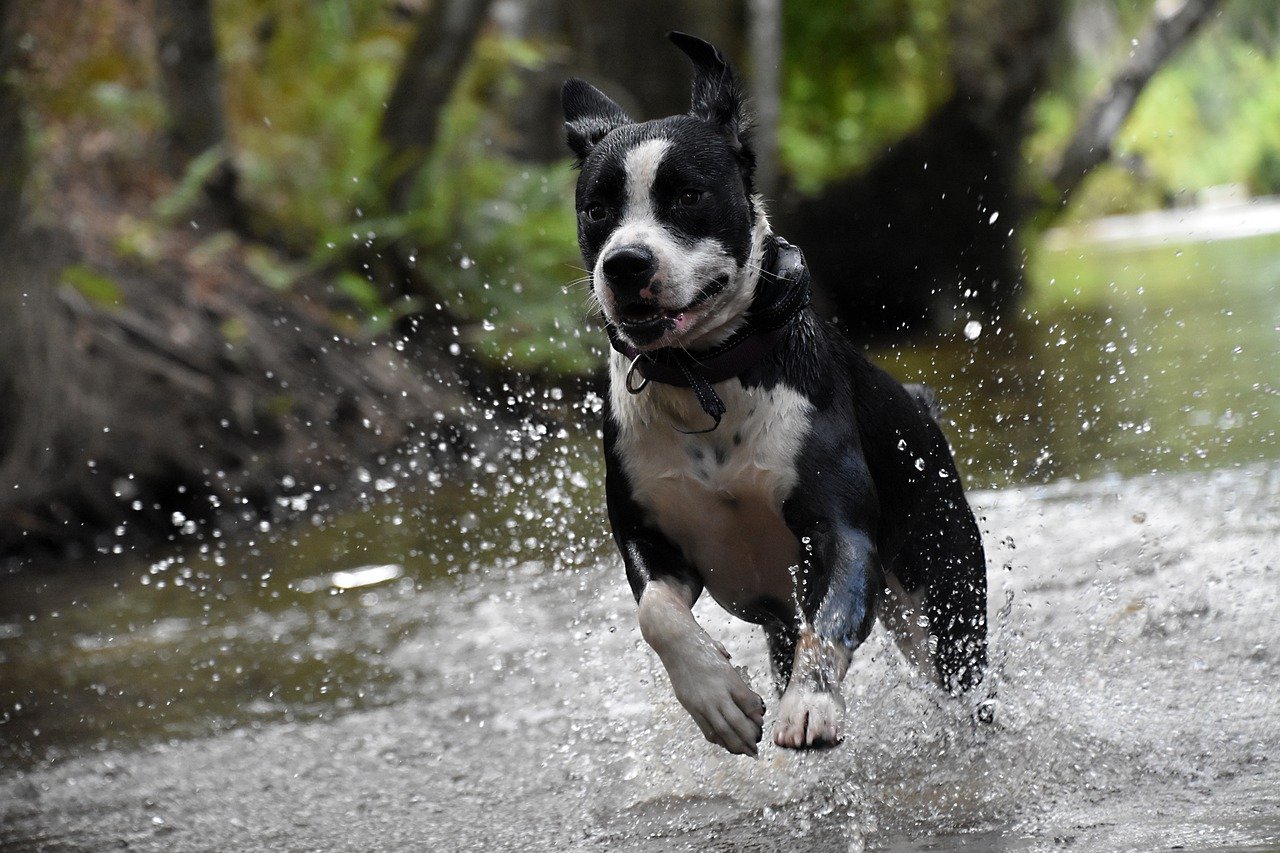
Home Remedies and Supplements
Managing digestive issues in senior pets can sometimes feel like trying to navigate a maze blindfolded. However, can be a beacon of hope, guiding you towards better digestive health for your furry friend. Many pet owners are turning to natural solutions to complement their pets' diets and alleviate discomfort. From probiotics to hydration strategies, let's explore how these remedies can make a significant difference.
First up, probiotics are a fantastic option. These live microorganisms are often referred to as "good bacteria" and can help restore the natural balance of gut flora. For senior pets, whose digestive systems may not function as efficiently as they once did, probiotics can support digestion and enhance nutrient absorption. You can find probiotics specifically formulated for pets in various forms, including powders, capsules, and treats. Always consult your veterinarian before introducing new supplements to ensure they're suitable for your pet's specific health needs.
Another valuable supplement to consider is digestive enzymes. These enzymes assist in breaking down food, making it easier for your pet's digestive system to process nutrients. As dogs and cats age, their bodies produce fewer digestive enzymes, which can lead to discomfort and nutrient deficiencies. Adding a digestive enzyme supplement to their meals can aid in digestion, reduce bloating, and improve overall gut health. Once again, it's crucial to discuss this with your vet to determine the right type and dosage for your senior pet.
Now, let's not forget about the importance of hydration. Water is the unsung hero of digestive health. For senior pets, maintaining proper hydration is vital, as it helps in the digestion process and keeps everything moving smoothly through the intestines. Dehydration can exacerbate digestive problems, so it's essential to ensure your pet has constant access to fresh water. If your pet is reluctant to drink, consider adding a splash of low-sodium broth to their water or offering ice cubes made from broth as a tasty treat.
To encourage hydration further, you might want to explore wet food options. Many senior pets find wet food more palatable, and it can significantly increase their water intake. If your pet is already on a dry food diet, mixing in some wet food can create a delicious combination that not only entices their taste buds but also boosts hydration levels.
Lastly, consider incorporating natural remedies like pumpkin or sweet potato into your senior pet's diet. These foods are rich in fiber, which can aid in digestion and regulate bowel movements. A small amount of plain, canned pumpkin (not the spiced pie filling) can be a tasty addition to their meals and help alleviate both constipation and diarrhea. Just remember, moderation is key; too much fiber can lead to its own set of problems.
In summary, while managing digestive issues in senior pets can be challenging, using home remedies and supplements can provide significant relief and improve their quality of life. Always keep an open line of communication with your veterinarian to ensure that any new treatments you introduce are safe and appropriate for your pet's unique health situation.
- What are the signs my senior pet needs more hydration? Look for signs like dry gums, lethargy, or decreased appetite. If your pet is not drinking enough, consider wet food or flavored water to encourage them.
- Can I give my pet human probiotics? It's best to use probiotics specifically formulated for pets, as human probiotics may not be suitable for their digestive systems.
- How can I tell if my pet's digestive issues are serious? If your pet experiences persistent vomiting, diarrhea, or significant changes in appetite or weight, consult your veterinarian immediately.
Probiotics and Digestive Enzymes
When it comes to enhancing your senior pet's digestive health, probiotics and digestive enzymes are like the dynamic duo of gut wellness. Just as a well-tuned orchestra produces beautiful music, these two components work in harmony to keep your pet's digestive system running smoothly. Probiotics are live microorganisms that, when administered in adequate amounts, confer a health benefit on the host. They help balance the gut flora, which can be particularly beneficial for older pets whose digestive systems may not function as efficiently. Think of probiotics as the friendly bacteria that help your pet's gut thrive, fighting off the bad guys and ensuring everything runs like clockwork.
On the other hand, digestive enzymes break down food into smaller, more absorbable components. As pets age, their bodies may produce fewer enzymes, leading to digestive discomfort and nutrient absorption issues. By supplementing with digestive enzymes, you can help your pet get the most out of their meals. Imagine enzymes as the hardworking crew behind the scenes, ensuring that every bite is utilized for maximum benefit.
When considering incorporating probiotics and digestive enzymes into your senior pet's diet, it's essential to choose the right products. Not all supplements are created equal, and quality matters. Look for options that are specifically formulated for pets, ensuring they contain the right strains of probiotics and the necessary enzymes for optimal digestion. Always consult your veterinarian before starting any new supplements, as they can recommend the best products tailored to your pet's unique needs.
Additionally, you might wonder how to introduce these supplements into your pet's diet. Here are some tips:
- Start Slow: Introduce probiotics and enzymes gradually to avoid any digestive upset.
- Mix It Up: Combine the supplements with their favorite food to make it more palatable.
- Monitor Closely: Keep an eye on your pet's reaction and overall health after starting the supplements.
In conclusion, adding probiotics and digestive enzymes to your senior pet's diet can provide significant benefits, supporting their digestive system and overall health. Just remember, every pet is unique, so what works for one may not work for another. Regular check-ins with your veterinarian will help you tailor the best approach for your furry friend.
Q: Can I give my senior pet human probiotics?
A: While some human probiotics may be safe, it's best to choose products specifically designed for pets to ensure safety and efficacy.
Q: How long does it take to see results from probiotics and enzymes?
A: It can vary, but many pet owners notice improvements within a few weeks of consistent use.
Q: Are there any side effects?
A: Most pets tolerate probiotics and enzymes well, but some may experience mild digestive upset initially. Always consult your vet if you have concerns.
Q: Can I stop giving these supplements once my pet improves?
A: It's best to consult with your veterinarian about long-term supplementation, as some pets may benefit from ongoing support.
Hydration and Its Importance
When it comes to the health of our beloved senior pets, hydration is often overlooked but plays a crucial role in their overall well-being. Just like humans, pets need a sufficient amount of water to maintain their bodily functions, and as they age, their ability to regulate hydration can diminish. This can lead to a myriad of health issues, particularly digestive problems. Think of water as the oil that keeps the engine running smoothly; without it, everything can start to grind and fail.
For senior pets, proper hydration is essential for several reasons:
- Digestive Health: Water aids in digestion and helps prevent constipation, which is a common issue in older animals.
- Kidney Function: Adequate hydration is vital for kidney health. Dehydration can exacerbate kidney issues, which are prevalent in senior pets.
- Temperature Regulation: Older pets may struggle with temperature regulation, and staying hydrated helps them maintain a normal body temperature.
So, how can you ensure that your furry friend is getting enough water? Here are some effective strategies:
- Fresh Water: Always provide access to clean, fresh water. Change the water daily to encourage drinking.
- Water Bowls: Consider using multiple water bowls in different areas of your home to make it easier for your pet to hydrate.
- Wet Food: Incorporating wet food into your pet's diet can significantly increase their water intake. Many senior pets find wet food more palatable, which can also stimulate their appetite.
- Flavor It Up: If your pet is reluctant to drink water, try adding a splash of low-sodium broth or pet-safe flavor enhancers to make it more enticing.
It's also important to monitor your pet’s water intake. If you notice a sudden increase or decrease in their drinking habits, it could signal an underlying health issue, and you should consult your veterinarian. Keeping an eye on their hydration levels can be as simple as observing their urine output; a well-hydrated pet will urinate more frequently and produce light-colored urine.
In conclusion, hydration is a fundamental aspect of managing your senior pet's health, especially regarding their digestive issues. By ensuring they have constant access to fresh water and making their hydration enjoyable, you can help them live a more comfortable and healthier life as they age. Remember, a well-hydrated pet is a happy pet!
Q: How much water should my senior pet drink daily?
A: A good rule of thumb is that pets should drink about 1 ounce of water per pound of body weight each day. However, this can vary based on their diet and activity level.
Q: What are the signs of dehydration in pets?
A: Common signs include dry gums, lethargy, decreased appetite, and skin that doesn't return to its normal position when gently pinched.
Q: Can I give my pet flavored water?
A: Yes, adding a little low-sodium broth can encourage your pet to drink more, but always ensure it’s safe and suitable for pets.
Q: Should I worry if my pet is drinking a lot of water?
A: Increased thirst can be a sign of health issues such as diabetes or kidney disease, so it’s best to consult your veterinarian if you notice this change.
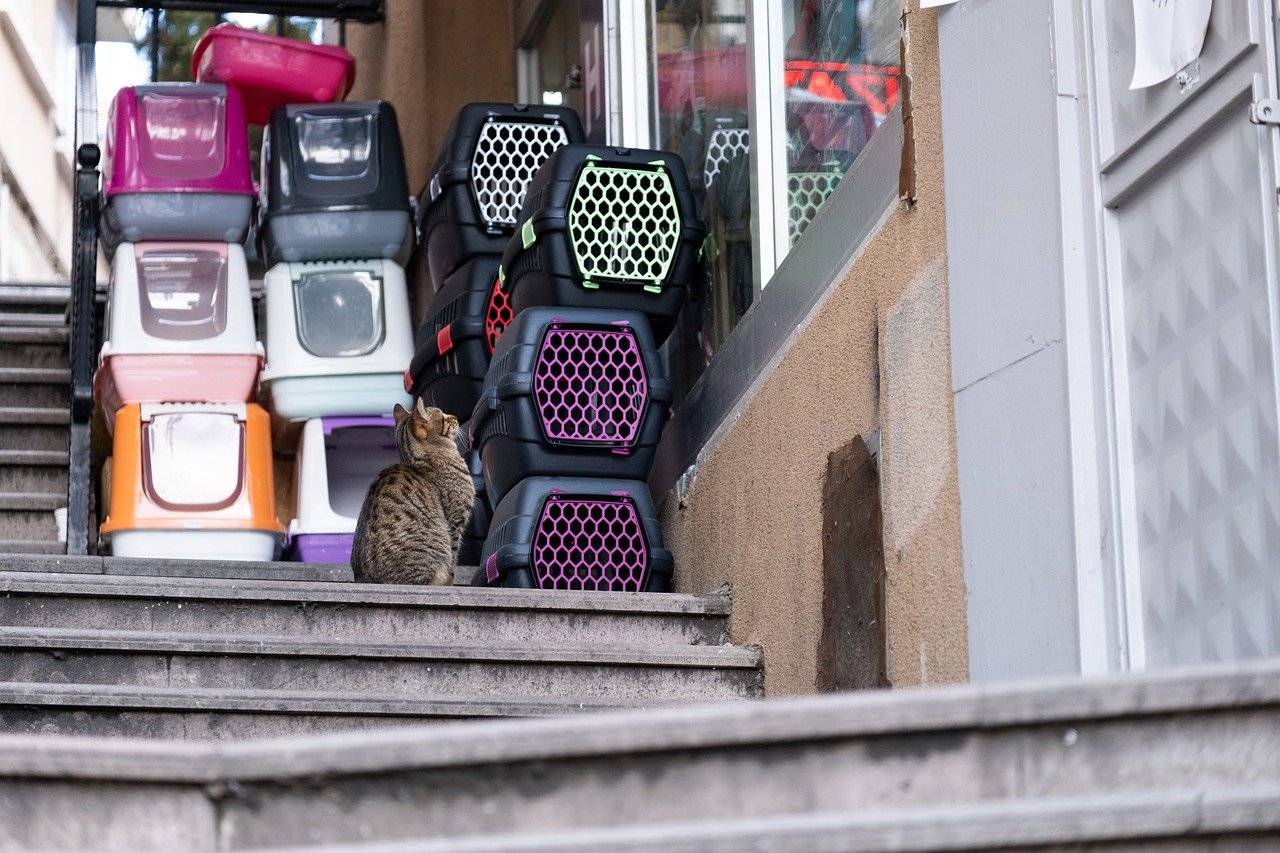
Monitoring and Follow-Up Care
When it comes to managing digestive issues in senior pets, ongoing monitoring and follow-up care are absolutely crucial. Think of it like a safety net; it ensures that you catch any potential problems before they escalate into something more serious. Just like we keep an eye on our own health, our furry friends deserve the same attention. Regularly checking in on their eating habits, bathroom routines, and general behavior can provide invaluable insights into their digestive health.
One effective way to track your pet's health is by maintaining a health journal. This doesn’t have to be anything fancy; a simple notebook or a digital document will do. Record details such as:
- Daily food intake and any changes in appetite
- Frequency and consistency of bowel movements
- Any vomiting or signs of discomfort
- Behavioral changes such as lethargy or increased irritability
By documenting these observations, you create a comprehensive picture of your pet's health over time. This can be incredibly helpful during veterinary visits, as you'll have specific information to share. It’s like bringing a report card to your doctor—much easier to diagnose if they have all the data!
Additionally, regular veterinary check-ups are essential for early detection of potential issues. Even if your pet seems fine, routine visits can uncover hidden problems that may not be immediately apparent. These visits allow your vet to perform necessary tests and evaluations, helping to ensure your pet remains healthy as they age. Remember, preventative care is always more effective than reactive care!
During these check-ups, don’t hesitate to ask your vet questions about your pet’s digestive health. Here are some questions you might consider:
- What dietary changes would you recommend for my senior pet?
- Are there specific supplements that could help?
- What signs should I look for that might indicate worsening digestive issues?
Ultimately, being proactive about your senior pet's digestive health can lead to a happier, healthier life. By monitoring their condition closely and maintaining open lines of communication with your veterinarian, you can ensure that your beloved companion receives the best possible care. After all, our pets rely on us to advocate for their health and well-being!
Q: How often should I take my senior pet to the vet?
A: It's generally recommended to schedule check-ups at least once every six months for senior pets, as they may require more frequent monitoring than younger animals.
Q: What are some common signs of digestive issues in senior pets?
A: Look for symptoms such as vomiting, diarrhea, changes in appetite, weight loss, or any unusual behavior. If you notice any of these, it's important to consult your veterinarian.
Q: Can I give my senior pet over-the-counter digestive aids?
A: While some over-the-counter products may be safe, it's crucial to consult your veterinarian before administering any medications or supplements to ensure they’re appropriate for your pet's specific condition.
Q: What dietary changes should I consider for my senior pet?
A: Opt for high-quality, easily digestible foods tailored for senior pets. Foods that are rich in fiber and low in fat can help alleviate digestive issues.
Keeping a Health Journal
Maintaining a health journal for your senior pet is one of the most effective strategies you can employ to manage their digestive issues. Think of it as a personal diary for your furry friend, where you document every little detail that could impact their health. This practice not only helps you keep track of symptoms but also aids in identifying patterns that may be crucial for your veterinarian's assessment. After all, just like humans, pets can’t always communicate how they feel, and having a record can be a game-changer.
When you start your health journal, consider including the following elements:
- Date: Always note the date of each entry. This helps you track changes over time.
- Symptoms: Document any signs of digestive distress, such as vomiting, diarrhea, or changes in appetite.
- Diet: Record what your pet eats daily, including any treats or supplements. This can help pinpoint any food-related triggers.
- Behavioral Changes: Note any changes in your pet’s behavior, such as lethargy or increased thirst.
- Veterinary Visits: Keep a log of vet appointments, medications prescribed, and any recommendations given.
This journal can be as simple or elaborate as you wish. You can opt for a traditional notebook or a digital format, like an app or a spreadsheet. The key is consistency; try to make entries at the same time each day, perhaps during feeding times. By doing so, you create a comprehensive picture of your senior pet's health, which can be invaluable during veterinary visits.
Additionally, having a health journal allows you to ask informed questions during vet consultations. For instance, if you've noticed a pattern of digestive issues after certain meals, you can share this information with your vet, leading to more targeted solutions. It’s like having a roadmap to your pet’s health, guiding both you and your veterinarian in making the best decisions for your furry companion.
In essence, a health journal is not just a record; it’s a proactive approach to ensuring your senior pet maintains a comfortable and healthy lifestyle. So grab a pen and paper or open that notes app, and start documenting your pet's journey today!
Q: How often should I update my pet's health journal?
A: Ideally, you should make entries daily, especially after meals or if you notice any changes in your pet’s behavior or health.
Q: What should I do if I notice concerning symptoms?
A: If you observe persistent or severe symptoms, consult your veterinarian as soon as possible. Use your health journal to provide them with detailed information.
Q: Can I include other aspects of my pet's life in the journal?
A: Absolutely! Feel free to note any changes in exercise, social interactions, or even mood, as these can all contribute to your pet's overall well-being.
Regular Veterinary Check-Ups
As our beloved pets age, their health needs evolve, making more essential than ever. These visits are not just routine; they are a critical component of maintaining your senior pet's health, especially when it comes to managing digestive issues. During these check-ups, your veterinarian can conduct thorough examinations, which may include blood tests, fecal tests, and even imaging studies to identify any underlying problems that may not be immediately visible. Think of these appointments as a health checkpoint, similar to how we humans go for annual physicals to catch potential issues early.
One of the key benefits of regular veterinary visits is the opportunity for early detection of health issues. For senior pets, conditions like kidney disease, liver problems, or gastrointestinal disorders can develop gradually. By the time symptoms become apparent, the condition may have progressed significantly. Thus, routine check-ups can lead to earlier interventions, which can greatly improve your pet's quality of life.
During these visits, your veterinarian will assess your pet's overall health and may provide tailored advice on diet and lifestyle adjustments. For example, if your pet is experiencing digestive issues, your vet may recommend specific dietary changes or supplements that can help alleviate discomfort. They can also identify any potential food allergies or intolerances that might be contributing to your pet's digestive problems.
To make the most of your vet visits, consider keeping a health journal for your pet. Documenting symptoms, dietary changes, and any behavioral shifts can provide valuable insights to your veterinarian. This information helps them tailor their recommendations and monitor your pet's progress effectively. You might be surprised at how much a simple note can make a difference in your pet's health management.
In conclusion, regular veterinary check-ups are not just a formality; they are a proactive approach to ensuring your senior pet leads a happy and healthy life. By staying on top of their health care, you can help your furry friend navigate the challenges that come with aging, especially when it involves digestive issues. Remember, a healthy pet is a happy pet!
Frequently Asked Questions
- What are the common digestive issues in senior pets?
Senior pets often face a range of digestive issues, including vomiting, diarrhea, constipation, and changes in appetite. These problems arise due to age-related changes in their digestive system and may also be exacerbated by underlying health conditions. It's essential for pet owners to be vigilant about these symptoms to ensure their furry friends remain comfortable.
- How can I tell if my pet's digestive issues are serious?
If your pet experiences persistent vomiting or diarrhea, significant weight loss, or shows signs of lethargy, it’s crucial to consult a veterinarian. Additionally, if your pet refuses to eat or drink for more than 24 hours, it’s a red flag that should not be ignored. Early intervention can prevent further complications.
- What dietary changes can help my senior pet?
Switching to a high-quality, easily digestible diet can significantly benefit senior pets with digestive issues. Look for foods specifically formulated for older pets, which often contain higher fiber and lower fat content. Gradually introducing new foods can also help minimize digestive upset.
- Are there any home remedies for digestive issues?
Yes! Some natural remedies like plain pumpkin puree, boiled chicken, and rice can help soothe an upset stomach. Additionally, incorporating probiotics can support gut health. However, always consult your veterinarian before trying new remedies to ensure they’re safe for your pet.
- How important is hydration for my pet's digestive health?
Hydration is crucial for maintaining healthy digestion. Senior pets are often at risk of dehydration, which can worsen digestive issues. Ensure your pet has access to fresh water at all times, and consider adding water or broth to their food to encourage them to drink more.
- Should I keep a health journal for my senior pet?
Absolutely! Keeping a health journal can help you track your pet's symptoms, eating habits, and any changes in behavior. This information can be invaluable for your veterinarian in diagnosing and managing your pet's digestive issues effectively.
- How often should my senior pet see the vet?
Regular veterinary check-ups are essential for senior pets, ideally every six months. These visits allow for early detection of potential digestive issues and other health concerns. Always consult your vet if you notice any changes in your pet's health or behavior in between visits.





